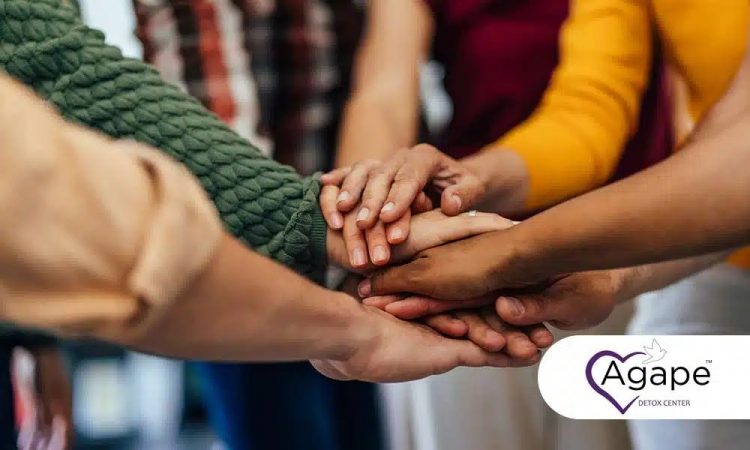Home » Support
Support
Table of Contents
ToggleAddiction Support at Agape Detox Center
Agape Detox is committed to providing a knowledge base for anyone to learn about addiction. Please feel free to explore each of our supportive material pages to become comfortable with terms used in addiction, its treatment, and recovery. These pages are also great for answering questions you may have but have been unsure where to get the answers from.

Support for Intervention Planning
Many people feel lost and helpless when faced with a loved one suffering from a substance or alcohol use disorder. Not knowing where to start or who to turn to for help can be troublesome. Learning how to plan and stage an effective intervention is no different. However, it is crucial for the addict to get the help they need.
An intervention is a thought-out meeting between the addict and their loved ones. Its purpose is to help the addict see they need help. Family and friends explain to the addict how their addiction has impacted their lives, and the people around them. The goal of an intervention is never to shame or blame someone. It is only to offer support in a loving, calm manner.
More information can be found on our Planning an Intervention page.
Support for Loved Ones
If a loved one is facing addiction, it can be hard to know where to turn. Fortunately, there are many resources available for the family and friends of those struggling with addiction. These resources include Al-Anon and Nar-Anon meetings, which are aimed at providing mutual aid. NAMI’s comprehensive education programs offer further support on how best to help addicts in your life. Therapy is also available for those who need extra guidance through this emotionally trying time. Remember, you don’t have to suffer alone.
Check out our Support for Loved Ones page for more detailed information.
Life After Addiction Treatment
Life after treatment is a time of transition. It is the time to form new habits, learn new skills, and become a healthier version of oneself. While in treatment, it is important to develop an aftercare plan that can help with the transition to life after treatment. This aftercare plan can include a list of relapse prevention tips, meeting schedules, and numbers of people to reach out to if help is needed. It can also include mindfulness activities like yoga, meditation, and Reiki.
Our Life After Treatment page offers many different resources and a wealth of information.
Relapse Triggers
Relapse triggers are specific things that may elicit a strong desire for someone to want to use again. There are several triggers that could initiate a relapse, but they are broken down into just two categories. Internal triggers are thoughts, and emotions, both positive and negative. External triggers are usually talked about in recovery as people, places, and things.
To explore more specifics on relapse triggers, please check out our Relapse Triggers page.
Your path to wellness starts here
Contact our detox center for professional support and guidance on your journey to recovery. Our caring professionals can help you take the first step towards a healthier, happier life.
Relapse Prevention
Preventing a relapse starts with a powerful aftercare plan. This plan should include prevention tools and strategies that could make the difference between walking a long-term recovery journey or a potential step off the path, known as a relapse.
Relapsing is when a recovering addict uses a substance again after a period of sobriety. When you’re attempting to heal, relapse is always just a misstep away. It’s said that 40 to 60 percent of those who suffer from a substance or alcohol use disorder will relapse at some point in their recovery journey.
For more information on preventing relapse, visit our Preventing a Relapse page.
What to Expect From Agape Detox Center
Agape Detox Center is located on the Atlantic Coast of southern Florida in Port St. Lucie. Here, the weather is warm and the surroundings are absolutely breathtaking. We offer a tranquil, serene environment where patients can enjoy consistent peace of mind and can focus entirely on getting well. We maintain a safe and comfortable treatment center that keeps patients totally removed from outside triggers, temptations, and stress. We’re staffed by a diverse and highly talented team of medical and mental health professionals.
When you arrive at Agape Detox, you’ll be met by compassionate individuals who are committed to helping you succeed. We’ll perform thorough medical and mental health evaluations to devise a customized plan for your care. Once you’ve toured our facility, met our staff, and settled into your room, you’ll receive around-the-clock monitoring. This way, we can track your vital signs and take steps to ensure that you remain stable, comfortable, and able to keep your recovery moving forward. As necessary, we’ll revise your detox plan to include additional interventions for constantly streamlined support.
- November 25, 2022
- Updated Date: December 13, 2023
Related services
Have any questions?

Stephanie Catalano, LCSW( Medical Reviewer )
Stephanie Catalano is an accomplished Clinical Director at Agape Behavioral Healthcare. With a Master of Social Work degree, LCSW license, and extensive training in Rapid Resolution Therapy under her belt, she brings a wealth of expertise to her role. Her unique combination of education and experience allows her to provide exceptional care to clients and lead her team with confidence. Stephanie’s joy comes from witnessing the moments when her patients creatively connect the dots and bravely move toward reclaiming their power. Her purpose is to help individuals understand their past so they can create a future full of hope, growth, and success. Stephanie attributes a large portion of her success to the supportive culture and strong sense of community fostered by the Agape team.


